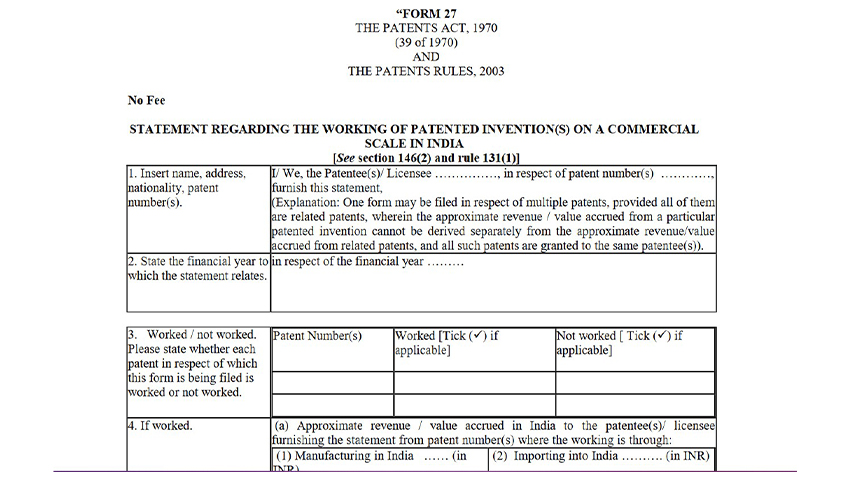The Statement of Working of Patents in India (Form 27) – A Complete Guide
General principle/ Purpose of Form-27
As enshrined in Section 83 “General principles applicable to working of patented inventions” of the Indian Patents Act, 1970, “patents are granted to encourage inventions and to secure that the inventions are worked in India on a commercial scale and to the fullest extent that is reasonably practicable without undue delay”. It is further enshrined that patents are granted to make the benefit of the patented invention available at reasonably affordable prices to the public. To abide by these general principles, the Indian Patents Act requires an annual statement of working of a patented invention to be submitted in the Indian Patent Office – a statutory obligation to be fulfilled by every patentee and every licensee, stipulated in Section 146 of the Indian Patents Act, 1970 read with Rule 131 of Indian Patents Rules, 2003.
This statement of working is to be submitted on Form 27 as prescribed in the Second schedule of the Patents Act.
The relevant Section and the Rule:
The requirement of submission of statement of working of a patent has been stated under Section 146 of the Indian Patents Act, 1970.
Section 146 is presented below:
Power of Controller to call for information from patentees
(1) The Controller may, at any time during the continuance of the patent, by notice in writing, require a patentee or a licensee, exclusive or otherwise, to furnish to him within two months from the date of such notice or within such further time as the Controller may allow, such information or such periodical statements as to the extent to which the patented invention has been commercially worked in India as may be specified in the notice.
(2)Without prejudice to the provisions of sub-section (1), every patentee and every licensee (whether exclusive or otherwise) shall furnish in such manner and form and at such intervals (not being less than six months) as may be prescribed statements as to the extent to which the patented invention has been worked on a commercial scale in India.
(3)The Controller may publish the information received by him under subsection (1) or sub-section (2) in such manner as may be prescribed.
The statement of working is thus to be furnished by every patentee and every licensee. While patentees can jointly file the statement of commercial working, each licensee will have to file the statement of commercial working, individually.
Timeline to file statement of working:
Rule 131 of The Patent Rules, 2003 (as amended) further specifies the timeline and the manner in which such statement is to be furnished. It is to be noted that the timeline within which the statement of working is to be furnished has been revised under Patent (Amendments) Rules, 2020.
The amended Rule 131 (2) is quoted herein below:
“(2) The statements referred to in sub-rule (1) shall be furnished once in respect of every financial year, starting from the financial year commencing immediately after the financial year in which the patent was granted, and shall be furnished within six months from the expiry of each such financial year.”
As per the amended Rule, the statement of working with respect to a financial year is to be furnished within six months from the start of next financial year i.e. by 30th September of the next financial year.
The Office of Controller General of Patents and Designs, and Trademarks has also requested the patentees and licensees to submit the Form 27 within the prescribed timeline vide a public notice dated June 30, 2022.
Information to be furnished:
The Patentee needs to furnish the following information on Form -27 regarding the Patented Invention:
The Patent has been worked or not worked on a commercial scale in India (mandatory requirement). In case the granted Patent is not worked in India, a statement of working is still required to be filed in India.
| If the Patent is being worked | If the patent is not worked |
| (a) Approximate revenue/value accrued in India to the patentee(s)/ licensee furnishing the statement from patent number(s) where the working is through:
(1) Manufacturing in India (in INR) (2) Importing into India (in INR) (b) Brief in respect of (a) above (maximum 500 words)
|
Reasons for not working the patented invention(s) and steps being taken for working of the invention(s)
|
Effect of non-working of Patent in India:
Non-working of the Patent does not invalidate the patent.
The purpose for filing of a working statement for a granted patent in India is to inform the public about the working or not working of the patent.
Any interested party can make a request for the grant of a compulsory license at any time after the expiration of three years from the date of grant of Patent, based on the following grounds:
- reasonable requirements of the public with respect to the patented invention have not been satisfied, or
- the patented invention is not available to the public at a reasonably affordable price, or
- the patented invention is not worked in the territory of India.
In case of any such request from a third party, the Applicant is informed of the same.
The grant of a compulsory license by the Indian Patent office is not a straightforward process and the Controller of Patents takes into account various factors before deciding on an application for a compulsory license. It is very rare. The non-working/inadequate working at a reasonable price of the Patent may help a third party to make an initial case but it will not be the sole determining factor in the grant of a compulsory license
A NO FEE form- an incentive:
It is to be noted that no official fee is required to be paid for filing the statement of working on form 27. This encourages the patentees and licensees to furnish the information multiple times without paying an official fee.
Recent amendments in FORM-27:
With a view to ease out the process of submitting this working statement, the Patent (Amendment) Rules, 2020 have been notified by the Government in October 2020, wherein Rule 131(2) has been amended in respect of the information to be disclosed and the deadline for submitting the statement of working. The Format of Form 27 has also been amended vide the Patent (Amendment) Rules, 2020. A copy of the same can be accessed from the link “https://ipindia.gov.in/writereaddata/Portal/Images/pdf/patents_amendment_rules_2020.pdf”
The following revisions were made in Form 27 by way of Patent (Amendment) Rules 2020:
- The revised Form 27 enables Patentee/Licensee to file one form in respect of multiple patents, provided all of them are related patents, wherein the approximate revenue/value accrued from a particular patented invention cannot be derived separately from the approximate revenue/value accrued from related patents, and all such patents are granted to the same patentee(s).
- Earlier, Form 27 was to be submitted within 3 months from the end of the calendar year (March 31st of each year). The revised Rules require the filing of the statement of working within 6 months from the end of the financial year. As per the revised Rules, the deadline to file the statement of working on Form 27 is September 30th of each year.
- In earlier Form 27, it was mandatory to provide the quantum and value of the patented product manufactured/imported, if the invention has been worked. In the revised Form 27, approximate revenue/value accrued in India to the patentee(s)/ licensee furnishing the statement from patented invention(s) manufactured/imported can be stated. The revised Form 27 also includes a column to give a brief (of a maximum of 500 words) of the above. This allows the Patentee/Licensee to provide an explanation when the approximate value and revenue are difficult to estimate. The revised Form does not require the quantum of the patented invention manufactured/imported to be stated. Only value accrued of the patented invention manufactured/imported is to be submitted.
- Earlier Form 27 required country-wise details to be given if the patented product has been imported from other countries. Revised Form 27 does not require such details.
- Revised Form 27 removed the requirement of disclosure of licenses and sub-licenses granted in respect of the patented product during the year.
- Revised Form 27 does not require a statement of whether the public requirement of the patented product has been met partly/adequately/to the fullest extent at a reasonable price.
Ramifications of not filing the Statement of working:
Penalty under Section 122:
Failure to file a statement of working does not affect the validity of an Indian Patent. The patent will remain in force.
However, the Indian patent law provides for the imposition of penalties in respect of a party that refuses or fails to supply information called for under the Act. Failure to furnish timely information is a punishable offense with a fine, which may extend to INR 10 lakh (approximately equivalent to USD 12,504) under Section 122 of the Act. Further, furnishing any false information or statement which the patentee/licensee, either knows or has reason to believe to be false or does not believe to be true, is punishable with imprisonment which may extend to six months, or with a fine, or both.
As per our information, no patentee has been fined in this regard.
Compulsory Licensing/Revocation under Sections 84 and 85:
As per Section 84 of the Indian Patents Act, 1970, any person interested may make a request for the grant of a compulsory license at any time after the expiration of three years from the date of grant of Patent, based on the following grounds:
(a) reasonable requirements of the public with respect to the patented invention have not been satisfied, or
(b) the patented invention is not available to the public at a reasonably affordable price, or
(c) the patented invention is not worked in the territory of India.
Further, where, in respect of a patent, a compulsory license has been granted, the Central Government or any person interested may, after the expiration of two years from the date of the order granting the first compulsory license, apply to the Controller for an order revoking the patent on the ground that the patented invention has not been worked in the territory of India or that reasonable requirements of the public with respect to the patented invention have not been satisfied or that the patented invention is not available to the public at a reasonably affordable price.
Case law: Natco v. Bayer: The Patent Office found that Bayer did not import the drug at all in 2008 and only started importing it in small quantities in 2009 and 2010. Natco applied for a compulsory license under Section 84 of the Patents Act, 1970 which was then granted by the controller and upheld later by the Bombay High Court on the basis that Bayer was not making the drug accessible to more people (requirement of the public for a reasonable price).
To date, only one compulsory license was granted that too for life-saving drugs. Thereafter few more applications for compulsory license were filed but rejected by the Patent Office.
Who can sign Form 27:
Form 27 can be signed by the Patentee/Licensee or by the Agent of the Patentee.
Thus, every patentee and every licensee should submit a statement of work clarifying the extent to which the patented invention has been worked on a commercial scale in India within the prescribed time period so as to exercise its patent rights to the fullest.

